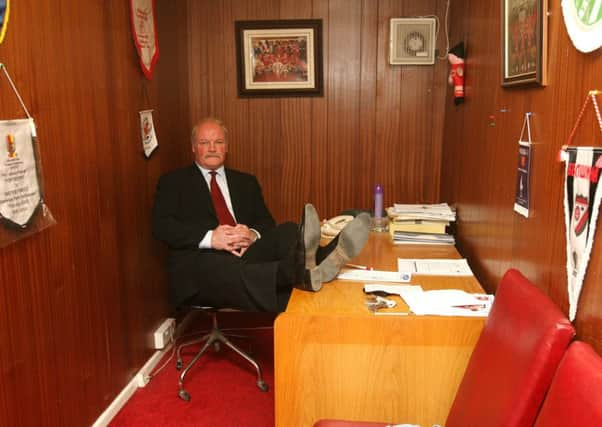'˜TIMES' OPINION: Impossible to match McFall's legacy but vital to learn lessons


Saturday, March 5, 2016 - Portadown 2 (Soares 58, Mackle 64) Lurgan Celtic 3: A final failure.
Two defining days divided by over two decades as part of 1,481 games and 23 trophies.
But one man. Always one man.
Advertisement
Hide AdAdvertisement
Hide AdThat magical April afternoon that sealed a first Irish League title in Portadown history cemented Ronnie McFall’s place in the record books and marked a touchstone moment in the managerial career of his hometown club that started in December 1986 and ended on Saturday with an Irish Cup exit to second-tier Lurgan Celtic.
There was a bittersweet poignancy attached to the image of Raymond Fitzpatrick’s last-gasp weekend penalty kick finding the same net into which Gregg Davidson had scored to wrap up the first Gibson Cup.
McFall’s legacy will endure thanks to a roll of honour considered improbable and impossible before his arrival as his much-lauded drive across those early days introduced a cold, hard winner’s mentality into a club which had laboured for so long under the cloud of hard-luck tales and talk of a gypsy curse.
The early 1990s appeared to capture lightning in a bottle over almost a decade of days to remember, nights on the M1 to and from cup ties in Belfast and a bond between players and supporters which remains to this day.
Advertisement
Hide AdAdvertisement
Hide AdAny analysis of his final decade - in the aftermath of what proved a closing major prize, the 2005 Irish Cup, would reveal an edge once enjoyed by Portadown that appeared blunted by the passage of time and changing Irish League landscape.
For a generation of fans, those past record-breaking trophy wins mean little more than dates on a page rather than memories. Older fans fortunate to have first-hand knowledge can recall the sleepless nights leading up to that first title, the sight of grown men crying at the culmination of those dreams and the image of Stevie Cowan dropping to his knees burned into the mind of every supporter in Windsor Park for that sun-soaked 1991 Irish Cup triumph.
The criticism of the modern fan has been the sense of entitlement cultivated by those past achievements but without the patience or loyalty of those who suffered the dark days before McFall’s seismic impact.
However, falling attendances and growing frustration on the terraces have developed from a fanbase defined not by age or experience but by a desire to see a return to the passion and drive so inextricably linked to the most memorable achievements under McFall.
Advertisement
Hide AdAdvertisement
Hide AdOnce the architect of a football machine that he assembled then unleashed on the Irish League, McFall’s closing stewardship has been too often a stuttering story of expectations ending in stale disappointment.
Spend any time with players from the golden title-winning eras and constant themes appear - praise for McFall’s passion and innovation to maximise a squad packed with a winning mentality and internal leadership.
Statistics would indicate a reduction in the efficiency of his methods. Players must always pay the price for on-the-field performances and should shoulder a large share of the burden for the lack of success across the past decade.
However, valid concerns from the supporters have often centred on the disparity between a budget considered one of the highest in the Irish League to falling short on the road to recapturing the alchemy behind major glory.
Advertisement
Hide AdAdvertisement
Hide AdThe introduction of a 38-game season has proven of particular hindrance based on facts and figures. The gamble on securing a small number of high-profile players on significant wages has often left a squad walking a tightrope due to lack of depth to cope with suspensions and injuries.
McFall’s ability to track a transfer target over the years before making his move was a magic touch that often helped to gain maximum value from the substantial financial backing down the decades.
Too often in the modern era squads assembled suggested hope on paper of progress but, ultimately, lacked those vital ingredients required to transform potential into a significant end product.
A vicious cycle of diminishing returns resulted in reduced financial resources that proved so central to McFall’s greatest achievements.
Advertisement
Hide AdAdvertisement
Hide AdThe mystique of a McFall side had disappeared in recent seasons, with the fear factor gone and rival clubs viewing the Ports as a viable target.
His permanent successor will face a club this summer suffering from a season engulfed in rancour, rumour and regret with only a small number of senior players connected beyond the end of the campaign.
Respect for the past is assured but a need to adopt a fresh approach in keeping with a modern era is a logical next step.
McFall’s decision to stay in the game is a testament to his devotion to a sport which has dominated his life. All great managers - McFall included - act without sentimentality and a ruthlessness in which the drive for that next trophy can justify all methods.
Advertisement
Hide AdAdvertisement
Hide AdThat same clinical eye is needed from those within the corridors of power to analyse why the management methods which produced such significant success at times failed to maintain the high standards set by McFall.
His standing as the greatest manager in Portadown’s history is assured. His achievements in turning a provincial club into a major force confirms his legacy within Irish League history.
But it is crucial that Portadown’s gatekeepers take lessons from both the positives and negatives of the McFall era.